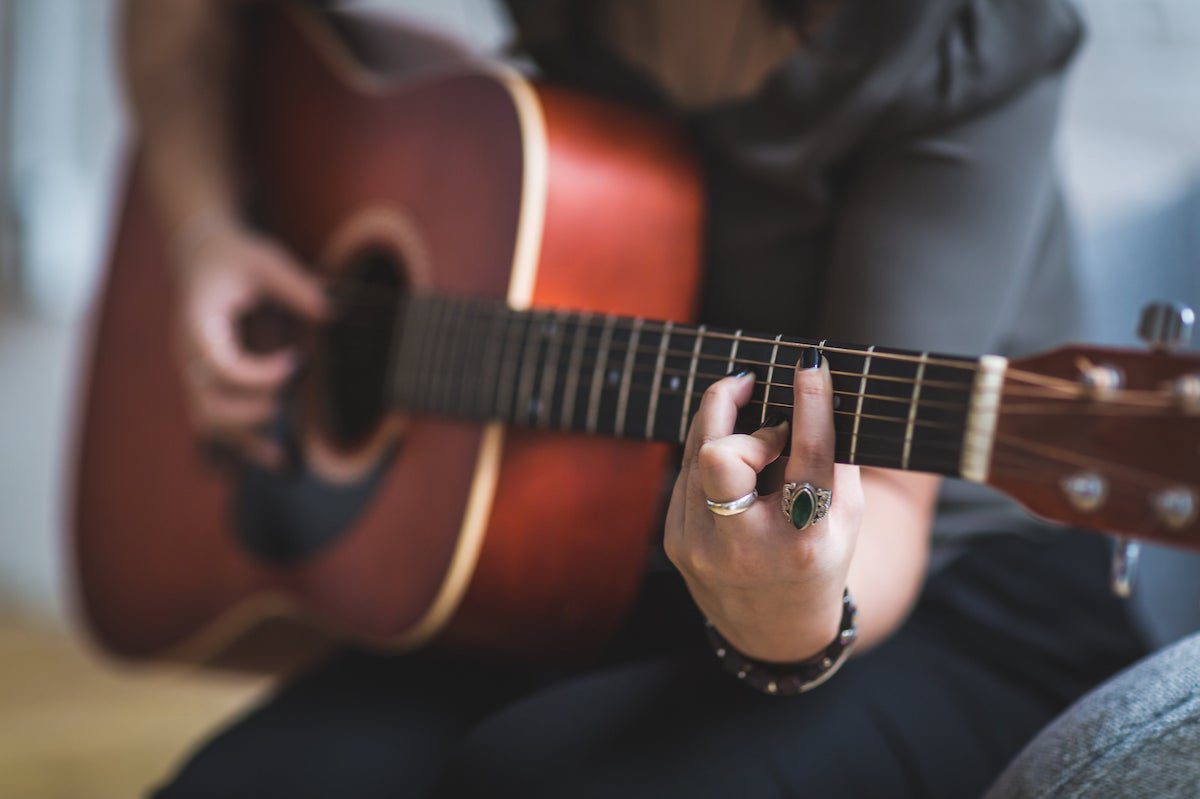Research shows that setting aside time to play an instrument, no matter your skill level or age, is fantastic exercise for your cognitive functions.
By Stacey Ellis
Admit it. You once harbored those daydreams of wowing an adoring crowd of thousands with your musical chops. But like those aspirations of pitching for the Braves or writing the Great American Novel, you left them behind and moved on to a more attainable level of success. Well, maybe now is the time to revisit those earlier impulses. Because, as it turns out, playing a musical instrument — even if you suck! — is great for you brain.
Research has found that playing an instrument can have profound effects on your brain and memory, providing musicians (and aspiring musicians) enhanced cognitive abilities. It’s an antidote to the excessive screen time we put ourselves through, which can disrupt sleep, decrease attention span, and even affect your mood — not to mention what it does to our eyes.
Cognitive Benefits of Playing an Instrument
Playing an instrument is like a comprehensive workout for your brain. It engages every major part of the noggin, simultaneously stimulating areas related to auditory, visual and motor skills. This workout results in a stronger, more connected brain with enhanced neuron links. It can help improve reading skills, math reasoning, and even social communication abilities. Plus, it’s a blast! So, if you’re looking for a way to give your brain a boost, why not pick up an instrument and dive in? Or pick up where you left off from those childhood piano lessons.

Researchers at the University of Bath in England found that beginning piano students who put in just one hour a week, over 11 weeks, reported noticeable improvements processing “multisensory information” — in other words, sight and sound, which has implications for just about every activity we do. Participants also said they had reduced anxiety, depression and stress.
“The findings from our study suggest that [playing music] has a significant, positive impact on how the brain processes audio-visual information even in adulthood when brain plasticity is reduced,” says Dr. Karin Petrini, a cognitive psychologist and music specialist in the university’s department of psychology.
Here’s How Playing Music Helps
Enhanced Memory and Learning — Musicians typically show improved memory, with an increased ability to recall information. This is due to the fact that playing an instrument stimulates the hippocampus, the part of the brain responsible for memory formation. And learning to read music and understand music theory can aid in the development of mathematical and spatial-temporal abilities.
Emotional Intelligence and Social Skills — Playing an instrument also influences our emotional intelligence. Musicians are typically more adept at identifying subtle emotional cues in conversation, which can lead to improved social interactions and relationships. Researchers have attributed this to musicians’ need to connect emotionally with the music they play.
Improved Focus and Discipline — Learning to play an instrument requires patience, discipline and focus. These skills are, of course, essential to other areas of life, often leading to improved academic and professional performance. Plus, the deep satisfaction that comes with mastering a piece of music can boost self-esteem and foster a sense of personal accomplishment.
Long-Term Cognitive Health — Beyond the immediate benefits, playing an instrument can contribute to long-term cognitive health. Research indicates that musicians are less likely to develop neurodegenerative diseases, such as Alzheimer’s, later in life. One study reported that musicians were 64 percent less likely to develop mild cognitive impairment or dementia, summarizing that there is “substantial protective effect of musical instrument playing on cognition.” This is likely due to the neural connections musicians build up over time.
An Antidote to Loneliness — America has a loneliness epidemic, and playing music (and coworking!) is a great way to connect with like-minded people. You can make new musical friends through workshops, group lessons, jam sessions, open mics, online music forums — heck, you could even start a band!

Picking Your Instrument
OK, now the fun part. You’re going to do it … but what instrument? Consider, if you will, the humble ukulele. This small, four-stringed instrument is relatively simple to learn and is perfect for strumming out pop songs or folk and country tunes. Plus, its lightweight and portable so it’s easy to practice anywhere — you could be strumming your favorite songs in no time at all. But really, the sky’s the limit, whether it’s a keyboard or clarinet … follow your passion. And don’t worry about the neighbors — even drums and bagpipes can be practiced quietly.
Additionally, online learning gives easy access to wonderful teachers, including well-known working musicians, to guide you through courses. And students benefit from being able to spend as much time as they need with the lessons.
Playing an instrument helps your brain in a number of ways, from enhanced memory and learning to higher emotional intelligence, better focus and discipline, and even long-term cognitive health. Making music is also great for your emotional health and can help us manage feelings of stress, anxiety, depression and loneliness. So play on!
Photos: Guitar Player by Matthew Henry, Piano Player by Sarah Pflug, Picnic by Samantha Hurley




